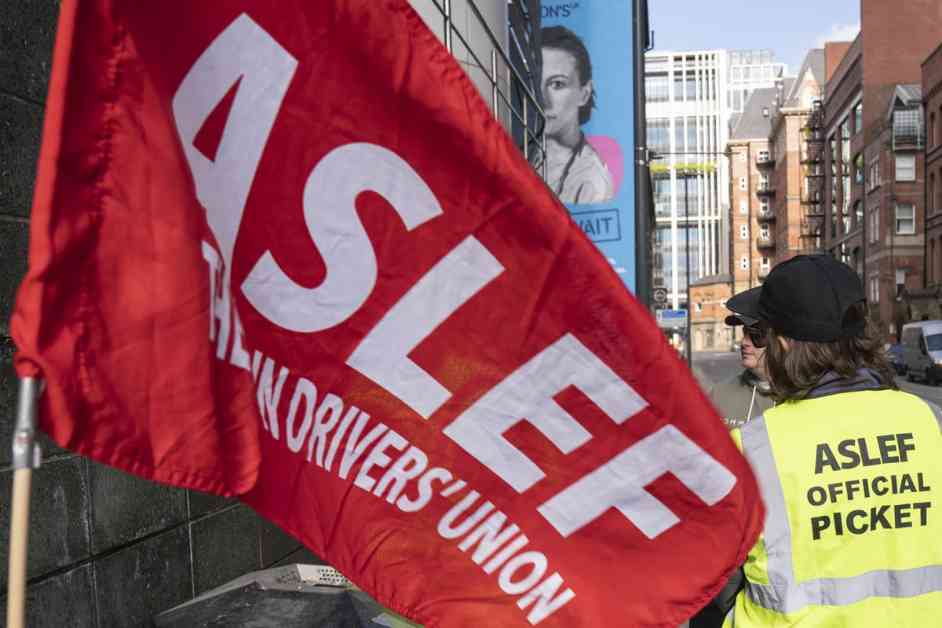Aslef, the train drivers’ union, has unveiled the concerning state of its members’ morale amidst an ongoing dispute with rail operator LNER. The union’s chief negotiator has described the situation as “toxic” and emphasized the detrimental impact it has had on the workforce. This revelation comes as Aslef announced plans for fresh strikes that are set to take place on weekends from the end of August until November 10th.
The dispute between Aslef and LNER revolves around working agreements, with the union citing issues such as “bullying by management and persistent breaking of agreements by the company” as key factors contributing to the conflict. While this particular disagreement is separate from the long-standing pay row that began in July 2022, a recent offer from the government has signaled a potential resolution to the salary dispute.
Aslef’s decision to proceed with strike action has sparked mixed reactions, with opposition MPs expressing concerns about the precedent set by the government’s offer of a 15% pay rise to the union without any conditions attached. Some have criticized Labour for being influenced by its union connections, while others have commended the new transport secretary, Louise Haigh, for her role in the negotiations.
Nigel Roebuck, Aslef’s lead negotiator, commended Haigh for her involvement in the pay talks but criticized LNER for obstructing efforts to resolve the ongoing dispute. He emphasized the importance of upholding agreements and respecting workers’ rights, stating that the current situation has led to a significant decline in morale among Aslef members. Roebuck stressed the union’s commitment to prioritizing its members and ensuring that their grievances are addressed effectively.
The planned strikes are scheduled to take place over 11 consecutive weekends, from September 1st to November 10th, causing potential disruptions for passengers traveling on the East Coast Main Line. While LNER has expressed disappointment over the union’s decision to proceed with strike action, they have reiterated their commitment to working towards a resolution that benefits all parties involved.
Impact of the Dispute on Workers
The ongoing dispute between Aslef and LNER has had a profound impact on the morale and well-being of train drivers working for the rail operator. Reports indicate that workers are experiencing heightened levels of stress and frustration due to the contentious nature of the negotiations and the perceived lack of respect from management.
One driver, who wished to remain anonymous, shared their experience of working under these challenging conditions. They described feeling demoralized and undervalued, highlighting the toll that the dispute has taken on their mental health and overall job satisfaction. The driver expressed a desire for a swift resolution to the conflict to restore a sense of stability and normalcy to their work environment.
The toxic atmosphere created by the ongoing dispute has not only affected individual workers but has also strained relationships between employees and management. Instances of alleged bullying and disregard for established agreements have further exacerbated tensions, leading to a breakdown in communication and trust within the workplace.
Political Response and Implications
The government’s recent offer of a 15% pay rise to Aslef without any conditions attached has sparked a debate among politicians and industry stakeholders. While some have praised the move as a step towards resolving the long-standing pay row, others have raised concerns about the potential implications of such an offer on future industrial relations within the rail sector.
Opposition MPs have criticized the government for setting a precedent that could encourage further industrial action by unions seeking similar concessions. They have also questioned the motivations behind the offer, suggesting that it may have been influenced by political considerations rather than a genuine commitment to resolving the dispute in a fair and balanced manner.
On the other hand, supporters of the government’s decision have lauded the move as a pragmatic solution to a complex problem. They argue that providing a substantial pay rise to Aslef without imposing conditions demonstrates a willingness to prioritize the well-being of workers and maintain a harmonious relationship with the union.
The implications of the government’s offer extend beyond the immediate dispute between Aslef and LNER, raising broader questions about the future of industrial relations and collective bargaining in the rail industry. The outcome of this conflict could set a precedent for how similar disputes are resolved in the future and shape the dynamics between unions, employers, and the government.
Resolution and Path Forward
As the dispute between Aslef and LNER continues to escalate, finding a resolution that satisfies all parties involved remains a top priority. Both the union and the rail operator have expressed a willingness to engage in constructive dialogue and work towards a mutually beneficial agreement that addresses the underlying issues fueling the conflict.
Key stakeholders, including government officials, union representatives, and LNER management, must come together to facilitate productive discussions and reach a consensus on how to move forward. By prioritizing transparency, accountability, and respect for workers’ rights, all parties can create a conducive environment for meaningful negotiations and eventual resolution of the dispute.
It is crucial for all stakeholders to recognize the human impact of the dispute and acknowledge the toll it has taken on workers’ well-being and livelihoods. By centering their efforts on finding common ground, addressing grievances, and fostering a culture of collaboration, Aslef and LNER can work towards rebuilding trust, restoring morale, and ensuring a sustainable future for all employees in the rail industry.
In conclusion, the ongoing dispute between Aslef and LNER underscores the complex challenges facing the rail sector and the need for effective conflict resolution mechanisms. By prioritizing the interests of workers, upholding agreements, and fostering a culture of mutual respect, all parties can work towards a resolution that benefits the industry as a whole and sets a positive precedent for future negotiations.

